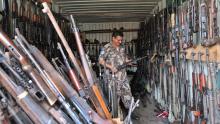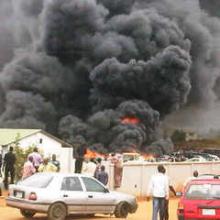Peace and Nonviolence
Reported by the Washington Post:
Russia and China on Thursday vetoed a U.S.-backed U.N. Security Council resolution threatening the Syrian government with sanctions, upending four months of diplomatic aimed at stemming a crisis that has left more than 14,000 dead. …
The vote, and the increasingly bloodshed in the Syrian capital, were a clear sign that a political resolution to the conflict in Syria remains out of reach.
As more details of this morning’s bombing in Damascus are known, the casualty list is growing. Among those killed were Syria’s Defense Minister, Deputy Defense Minister (who was President Bashir’s brother-in-law), and a senior general who was also a former Defense Minister. The head of the National Security Office and the Interior Minister were among those seriously wounded.
In an early afternoon story, the Associated Press quoted U.S. Defense Secretary Leon Panetta saying that the crisis in Syria is "rapidly spinning out of control.” British Defense Minister Philip Hammond, who spoke at a press conference with Panetta, said the Assad government is suffering "probably some fragmentation around the edges" as it struggles to keep a grip on power. "There is a sense that the situation is deteriorating and is becoming more and more unpredictable," Hammond said.
A later AP report noted:
"Rebels claimed responsibility for the attack, saying they had been planning it for two months and finally decided to plant the bomb in the room where the top government security officials in charge of crushing the revolt were holding a crisis meeting."
Reuters reported this afternoon on the continuing violence:
"The government vowed to retaliate, and residents said army helicopters fired machine guns and in some cases rockets at several residential districts. Television footage showed rebels storming a security base in southern Damascus. By nightfall, activists said Syrian army artillery had begun shelling the capital from the mountains that overlook it."
As the violence escalates, let us pray for a peaceful resolution in Syria, especially for the civilians caught between the two forces.

Many discussions about the use of drones center on whether using drones is “moral,” that is, does it satisfy just war doctrine? Is the use of an unpiloted drone morally different from a jet fighter, a helicopter gunship, or an infantryman with a rifle?
Scott Shane, national security reporter for the New York Times, recently attempted to argue "The Moral Case for Drones." Frankly, his case is weak. Shane dismisses as “baggage” a number of the most important arguments: “their lethal operations inside sovereign countries that are not at war with the United States raise contentious legal questions. They have become a radicalizing force in some Muslim countries. And proliferation will inevitably put them in the hands of odious regimes.”
Then the rest of the column deals with whether or not civilians are being killed.

Talks between the U.S. and Pakistan on drone attacks will resume this month, including a visit by the head of Pakistan’s intelligence agency to Washington. The U.S. continues to see the strikes as essential to its counter-terrorism efforts, and Pakistan continues to see them as a violation of its sovereignty. Associated Press reports:
"They start at an impasse, with the U.S. already determined to reject Pakistan's demands to end CIA drone strikes. Pakistani officials will also be pushing a plan to replace the CIA drone campaign with Pakistani F-16 strikes, and eventually its own armed drone fleet — a proposal that U.S. officials say they have rejected many times before. The divergent views reflect the deterioration in U.S.-Pakistani ties over the last 18 months, and the hardening of positions on both sides."
The Pakistani newspaper DAWN adds this from a “senior Pakistani security official” via Agence France-Presse: “This visit comes against the backdrop of extensive consultations between civilian and military leadership and the general has been authorised to take a firm stand on drones issue during his talks,”

In an Indigenous region of Colombia's Cauca province, activists armed with ceremonial wooden staffs, moral authority, and *lot* of moxie are telling both government armed forces and guerrillas to get out of their territory. In the face of an upsurge in guerrilla-vs.-state violence, Colombian President Manuel Santos made a saber-rattling visit to the town of Toribío to hold an emergency cabinet meeting there, but indigenous activists from the Nasa ethnic group--all too aware that government troops' presence in civilian areas can paint a target on them--were not impressed with Santos' offer of more of the same.
“The military can’t protect us and the guerrillas don’t represent us,” [Indigenous Guard leader] Mensa said, as he cradled the tasseled staff that identifies the volunteer guard. “All of them need to leave this area and let us live in peace.”...
"Even before Santos had finished the emergency meeting, the community had decided to take matters into its own hands. One group confronted the FARC at the roadblocks and another walked more than two hours to a barren mountaintop army battalion that overlooks Toribío.
"After a short standoff with troops, about 200 people swarmed the base and began toppling sandbagged bunkers and filling in foxholes."...
"At the FARC roadblocks, villagers shouted the guerrillas back into the jungle and seized five homemade mortars, called tatucos..."
Read more from the Miami Herald.
When I visited Colombia last summer, I interviewed two members of the Indigenous Guard for an article for Sojourners magazine, and was deeply inspired by their commitment, strategy, and guts.
Dr. Josef Olmert asks if, as the Syrian conflict rages in the streets of Damascus, the end is near?
"It has been in the making, as consistently predicted in this blog, and now it is finally happening. The Sunni uprising against the Alawite-dominated regime of Bashar Assad is fast approaching the point of decision. The battles are taking place in the capital Damascus, and the reports, while some may be somewhat exaggerated, are very clear: the rebels of the Free Syria Army are fighting in the very center of the city, are about to be, or already are in control of some of the headquarters of the once feared intelligence organizations, and it is all taking place minutes away from the presidential palace. By some accounts, the palace is without residents, as Bashar and his immediate family have already moved to the Alawite Mountains, something that was also predicted in this blog."
Learn more here
Chris Hedges has a fascinating piece for Salon on the betrayal of the most vulnerable by war:
"We condition the poor and the working class to go to war. We promise them honor, status, glory, and adventure. We promise boys they will become men. We hold these promises up against the dead-end jobs of small-town life, the financial dislocations, credit card debt, bad marriages, lack of health insurance, and dread of unemployment. The military is the call of the Sirens, the enticement that has for generations seduced young Americans working in fast food restaurants or behind the counters of Walmarts to fight and die for war profiteers and elites.
The poor embrace the military because every other cul-de-sac in their lives breaks their spirit and their dignity. Pick up Erich Maria Remarque’sAll Quiet on the Western Front or James Jones’s From Here to Eternity. Read Henry IV. Turn to the Iliad. The allure of combat is a trap, a ploy, an old, dirty game of deception in which the powerful, who do not go to war, promise a mirage to those who do."
Read the full article here

There’s a famous maxim that says, “The only thing necessary for the triumph of evil is for good men to do nothing.” Though Wikipedia says otherwise, the statement is often attributed to Edmund Burke.
I doubt that Wikipedia will give me the credit for this 200 years from now, but I’d like to take a crack at a counterpoint to Burke’s famous maxim anyway: Sometimes evil triumphs not when good people do nothing, but when good people fail to distinguish between hypothetical evil and real evil, and end up doing something about the former when they should be doing something about the latter.
Case in point: National Conservative Christian radio host Kerby Anderson’s attempt to rally his followers to thwart the Senate from ratifying the Arms Trade Treaty.

Ongoing violence in Nigeria has exacerbated tensions between the country's Muslims and Christians. Nigeria has equal numbers of Christians and Muslims, and 92 percent of the country's population says they pray every day, according to a 2010 poll by the Pew Forum on Religion & Public Life.
Hundreds of Christians and Muslims have died this year alone, including scores killed last weekend (July 7-8) when Muslim militants attacked Christian villages in the nation’s central plateau, where the mostly Muslim north and the mostly Christian south meet.
Read five things you should know about the violence in Nigeria inside the blog...

Members of Congress with common interests often create a caucus to advocate for that interest. Some have become permanent institutions – think the Congressional Black Caucus – others are more short-term. One of the more recent, reported by Arizona Public Radio, is the Unmanned Systems Caucus. Its role?
“Primarily, the caucus advocates for drones — those pilot-less planes infamous for their role targeting insurgents in Afghanistan and Pakistan. They’re used as a spy tool in Iran, a drug-fighting tool in Mexico and an anti-smuggling tool along the U.S.-Mexico border. …
The drone caucus — like the technology it promotes — is becoming increasingly important in the nation’s capitol as the government looks to unmanned vehicles to help save money on defense, better patrol the country’s borders and provide a new tool to U.S. law enforcement agencies and civilians.”
And that advocacy is being rewarded. The report cites Alex Bronstein-Moffly, an analyst with First Street Research Group, a D.C.-based company that analyzes lobbying data:
“Many of the drone caucus members are well supported by the industry they endorse. According to Bronstein-Moffly’s data, the 58 drone caucus members received a total of $2.3 million in contributions from political action committees affiliated with drone manufacturers since 2011.”

Over the past several weeks, the U.S. has been expanding its military presence in the Persian Gulf, increasing its capability to act if hostilities begin with Iran. Minesweepers are intended to keep the Strait of Hormuz open, and additional fighter jets increase the ability to launch strikes into Iran.
The latest development, reported by the Los Angeles Times, sea drones.
“The Navy is rushing tiny underwater drones to the Persian Gulf to help find and destroy sea mines as part of an American military buildup aimed at stopping Iran from closing the strategic Strait of Hormuz in the event of a crisis, U.S. officials said.
Only 88 pounds and 4 feet long, the unmanned, remotely guided submersibles carry a TV camera, homing sonar and an explosive charge for what amounts to a kamikaze mission: When it detects a mine, the undersea craft obliterates itself as well as the mine.
The Navy bought dozens of the little-known German-made devices, known as the SeaFox, in February after an urgent request by Marine Gen. James Mattis, the top U.S. commander in the Middle East, for more minesweeping capabilities in the region.”
According to Reuters, opposition forces in Syria are reporting that 220—mostly civilians—were killed by Syrian forces in the bloodiest day so far.
"According to a detailed account by activists before news of the massacre, a convoy of 25 vehicles with army and security forces headed west after dawn on Thursday, with three armoured vehicles and five trucks towing artillery, passing through the town of Muharda in the direction of the village of Tremseh.
"They blockaded the village from all four sides and began violently and randomly firing on houses as a helicopter flew overhead. As the attack happened the electricity and telephone lines were cut. Residents gathered in the streets in a state of fear and panic. They were unable to flee because of the blockade from every side," the report posted on activist Web sites said."

Unpiloted drone aircraft are already being used for some purposes in the United States, and plans are being made for greatly expanded use. Alongside these plans, efforts to control and regulate this use are also growing, bringing together libertarians and civil liberties organizations.
One of the most conservative state legislators in Virginia, Delegate Todd Gilbert, and the American Civil Liberties Union (ACLU), are working together to pass legislation that would regulate the use of drones. The Associated Press reported:
"The increasing use of drones as a surveillance tool by police and government agencies has prompted privacy concerns nationwide. A trade group for drone manufacturers recently unveiled its first code of conduct to reassure a public leery of the possibility of drones monitoring them in their homes.
However, Gilbert said he and the ACLU believe drones should be strictly regulated to protect Virginians’ privacy and civil rights. …
Gilbert said his bill would require police to get a warrant before using drones. It also would impose public monitoring and accountability standards and require the destruction of any pictures acquired by drones unless they are part of an authorized investigation."
 The Washington Post reports:
The Washington Post reports:
“The Pentagon is considering awarding a Distinguished Warfare Medal to drone pilots who work on military bases often far removed from the battlefield.”
If the medals are approved, that makes killing people from a computer in the U.S., thousands of miles from a combat zone, “distinguished warfare.” Will hazardous duty pay come next?
With the Olympics just a few weeks away, Time reports on the fight that has broken out over security for the Games:
"Policing the world’s biggest peacetime logistics operation is a herculean task, and Britain’s intelligence and military officials are preparing for every eventuality — even if it means festooning a few apartment buildings with Rapier missiles.

The Pakistani newspaper DAWN reports that in an interview with CNN, Pakistan’s Ambassador to the US, Sherry Rehman said her government has not approved continuing drone strikes.
“There’s no question of it. We also consider it, the drone program, we consider it counterproductive to all our goals in the sense that it radicalizes for the, it radicalizes foot soldiers, tribes and entire villages in our region. And what we see, really, is that increasingly Pakistan is feared as a predatory footprint. The concerns over drones can’t just be brushed aside.”
She said that the government considered the strikes to be a violation of international law, and that the damage done by the strikes outweighed the claimed benefits.
“It is something that is not only radicalizing large swaths of the population and it is also seen as predatory. It’s seen as against the law. And it continues to challenge a relationship that can actually accomplish a lot more on the ground than we are doing today in eliminating terrorism.”
The State Deparment yesterday released a statement on the imprisonment of Iranian Christian Pastor Youcef Nadarkhani, who has been imprisoned for over 1000 days on charges of apostasy.
Organizations and countries has been calling for his release since he was imprisoned, but Iranian authorities has yet to agree to release him. A new date for Pastor Nadarkhani's trial has also been set recently.
Read the statement in full below:
U.S. DEPARTMENT OF STATE
Office of the Spokesperson
For Immediate Release July 9, 2012
2012/1118
STATEMENT BY VICTORIA NULAND, SPOKESPERSON
Continued Imprisonment of Christian Pastor Youcef Nadarkhani and
Repression of Minorities in Iran
We note that July 8 marked 1,000 days Christian pastor Youcef Nadarkhani has spent in an Iranian prison. Pastor Nadarkhani still faces the threat of execution for simply following his faith, and we repeat our call for Iranian authorities to release him immediately.
Unfortunately, Pastor Nadarkhani is not alone in his suffering. The Iranian regime continues to deny and abuse the human rights of its citizens, in particular those of its many ethnic and religious minorities. We are troubled by reports of the execution of four members of Iran’s Ahwazi Arab community, whose sentences were carried out with little due process. In March 2012, Iranian state media broadcast the forced confession of one of those executed.
We are also concerned by credible reports that prominent author Mohammad Soleimani Nia is missing following his release in May after five months in prison on unspecified charges.
We call upon Iranian authorities to respect and protect the freedoms and dignity of all its citizens, and to uphold its own laws and international obligations which guarantee such rights to all Iranians, regardless of their religious or political beliefs.
# # #
The Atlantic's national correspondent, Jeffrey Goldberg, on the Syrian crisis and how the U.S. should respond:
"Secretary of State Clinton has again stated that it is only a matter of time before the regime of Syrian dictator Bashar al-Assad collapses. Speaking in Tokyo to reporters, she said: "The sand is running out of the hourglass," and went on to say, "There is no doubt that the opposition is getting more effective in their defense of themselves and in going on the offense against the Syrian military and the Syrian government's militias. So the future, to me, should be abundantly clear to those who support the Assad regime: the days are numbered."
But what is the number? And could the Administration be doing more to move that number down? When it comes to Syria, this administration has a very elastic sense of time."
Learn more here

The first news stories Friday afternoon (from AP and AFP) wrote of 4 suspected militants killed by two missiles fired from a drone in northwest Pakistan. It was soon updated to 9 dead, which is what we reported at the end of the day.
This morning, I checked my Reader and found 30-some new stories overnight (many just repeats of updated wire stories.) But the stories and death totals were all over the map. Some still echoed the earlier AP story; there were also reports of 12 deaths, or 15, or 21, and a few 24. The most comprehensive stories told of three drones. According to the Pakistani newspaper The Nation:
"The initial strike on a house killed 13 militants, five more were killed in a second attack when they drove to the site to recover dead bodies, and a third drone killed six more five minutes later, a senior security official in Peshawar said."
Other stories also recounted the 3 drone strikes, but gave varying numbers of deaths in each of the three.
Here is a more detailed version from DAWN, another Pakistani newspaper, which tells of multiple drones and 20 deaths:
"According to sources, six missiles hit the fortress-like residence of tribesman Muhammad in Zoi Nari locality of tehsil Dattakhel at around 8:45pm.
Local people rushed to the site of the attack and started rescue work while drones continued to hover over the area. They retrieved 17 bodies and two injured persons from the rubble of the house.
At about 10:30pm, the drones fired another two missiles on the compound, some 35km from the agency’s headquarters of Miramshah, when tribesmen were still carrying out rescue work. Three people died and two others were injured in the attack.
Local tribesmen feared the number of the people killed or injured might go up because they had to stop work due to the hovering drones. They said most of the bodies retrieved were mutilated beyond recognition."
These details raise two questions:
First, will we ever know how many deaths there were on Friday? And if they were militants, civilians, or both?
Second, even if one accepts the U.S. rationale for targeting militants (which I don’t), if it is true that after the initial strike, a second strike was launched some time later against rescue and recovery efforts, experts consider that a violation of international law – a war crime.
Perhaps in another day or so we will get the complete story, with timeline and casualty totals. But what is already clear is that these attacks must stop.

The Associated Press and Agence France Press (via The Nation in Lahore, Pakistan) are reporting this afternoon that a drone strike killed at least nine suspected militants in a small village near Miranshah, the main town of North Waziristan tribal district. At least three others were injured.
AP reports “The militants were believed to be fighters loyal to Hafiz Gul Bahadur, a militant commander whose forces frequently target U.S. and NATO forces in neighboring Afghanistan. A similar drone attack on Sunday killed eight of Bahadur's fighters.”
As always, the necessary disclaimer is that we may never know whether all or only some of these “suspected militants” were in fact militants. Remember that the U.S. definition is that anyone in a strike area is assumed a militant unless there is clear evidence after the fact. And after a direct hit from a Hellfire missile, there may not be any evidence left to examine.